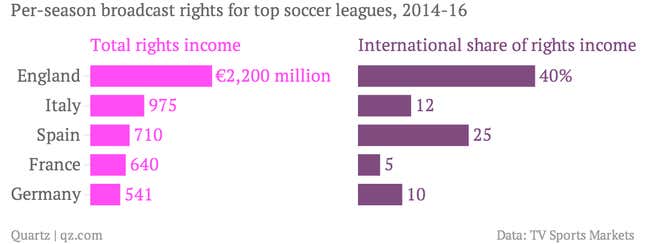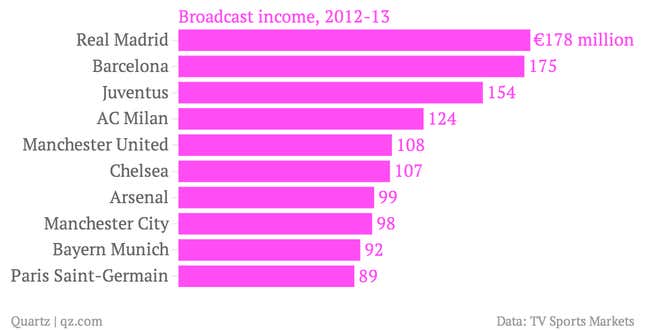Live sports is one of the few remaining ways for broadcasters to guarantee a large, captive audience, and they’re willing to pay big money to secure the rights to air popular games.
Take professional soccer. The five largest leagues in Europe will rake in more than €5 billion ($6.7 billion) per season from their latest broadcast rights deals, according to a new report. Thus, the leagues will collect €1 billion more per season during the three-year period to 2016 versus the previous cycle, reckons research firm TV Sports Markets.
This is undoubtedly a good thing for the leagues, but divvying up the spoils between teams (or clubs, as they’re known) is increasingly contentious. In England and Germany, broadcast revenues are distributed equally among teams to ensure that the league stays competitive and interesting. Spain and Italy, however, follow a winner-takes-all approach that rewards the top teams more handsomely. The money now flowing into professional soccer thus risks stoking tensions between teams and leagues—teams in the countries where revenues are shared may push for a bigger slice of the pie, while leagues in countries where a select few teams dominate will push for a more equitable balance.
The English Premier League is far and away the most lucrative domestic competition. It benefits in particular from international rights deals, which account for a far larger share of overall broadcast income than at rival leagues. The league’s ability to attract fans around the world reinforces its bargaining power with broadcasters, which in turn allow its teams to attract the world’s best players, which makes the league more appealing to a broader base of soccer fans.

In terms of growth, Germany’s Bundesliga is also noteworthy, with both domestic and international rights rising by more than 50% during the latest sales cycle. Shrewd management of the national team and the domestic league nurtured a generation of players that now ranks among the strongest in the world. Fox recently bought the rights to broadcast the Bundesliga in 80 countries from 2015, paying around twice the current rate.
In Spain, individual teams sell their own rights, which gives the country’s two most popular teams—Barcelona and Real Madrid—around half of the league’s total broadcast revenue, in addition to earning them the fattest fees from media rights of any other teams in the world. The top English and German teams could probably make a lot more if they were to follow the Spanish or Italian models.

The temptation to strike out alone is reinforced by the popularity of the Champions League, which pits Europe’s top-ranked teams against each other in a tournament every year. In the UK, BT recently spent £897 million ($1.4 billion) to broadcast Champions League games for three years from 2015, doubling the value of the current British broadcast deal.
This is fueling a rise in chatter about a so-called “super league,” a breakaway competition featuring the same group of teams from across Europe each year. This would no doubt cement the supremacy of today’s leading teams for good and guarantee them big broadcast revenues. In the current Champions League set-up, only the teams that finish at the top of their domestic leagues are allowed in the tournament the following year. But super-league teams, flush with cash, would always be able to afford the best players and dominate their domestic leagues.
This could make leagues across Europe as top-heavy as Spain’s—Real Madrid or Barcelona have won the Spanish title in nine of the past ten seasons, with other teams struggling simply to pay the bills. On the pitch, the best players rely on less skilled teammates to succeed; in the boardroom, league officials will use a similar argument to fend off any separatist tendencies among top teams.
